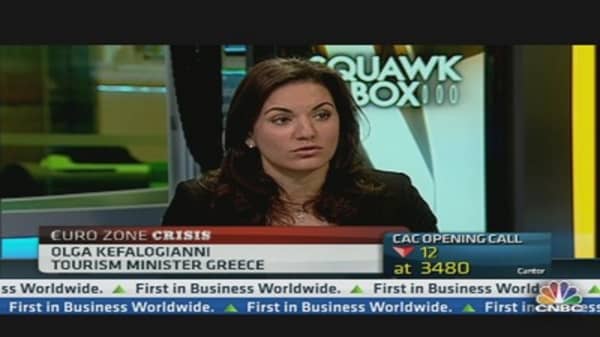The Greek government is hoping to pass two votes through parliament in what is set to be a key week for the struggling euro zone country, with one Greek minister telling CNBC that overcoming these hurdles will end talk of Greece leaving the single currency.
"It is a very critical week", Greek tourism minister Olga Kefalogianni told CNBC Monday.
"These two votes in parliament will mean that, from next week on, talk about Greece exiting the euro zone will be out of context. So it is critical."
The government is set to submit its latest round of austerity measures on Monday with a vote on Wednesday at it hopes to receive further aid from the International Monetary Fund and the European Union.
Deutsche Bank's George Saravelos believes that there is an 80 percent chance that the reforms can be pushed through parliament.
"Clearly the 20 percent outcome wouldn't be good and even a passing still leaves a difficult winter ahead. So we need to watch this as a potential risk," the bank said in a research note.
Analysts at Deutsche Bank believe the European Central Bank is ready and willing to act, meaning any Spanish debt problems won't come to the fore until next year. Their focus is firmly on Greece.
Greek politicians are also expected to approve the budget for 2013 on Sunday, releasing 31.5 billion euros ($40.3 billion) in funds. Yet more signs of swingeing cuts and tax increases have led to promises of more protests from Tuesday onwards by Greece's main private and public unions.
(Read More: Crucial Votes Will End Talk of Greece Exiting Euro: PM)
"You can never have these austerity measures passed without having some sort of social unrest," Kefalogianni said.
"We can understand that Greek society is going through turmoil and this is why for this government it's very important, first of all, to have political stability to safeguard the social cohesion and, of course, to secure the economy."
The newsflow has been dismal for Greece in recent weeks. Finance Minister, Yannis Stournaras, announced last Wednesday that the country's debt-to-GDP ratio will hit around 190 percent, ten percentage points more than first expected.
(Read More: Euro Zone Aims for Greek Bailout Deal on Nov 12)
Labor reforms already passed have been deemed illegal in a non-binding ruling by the Council of Europe, an international organization set up to protect the rule of law in Europe. Further labor reforms are in jeopardy with the Greek parliament's junior coalition partner looking to vote against such measures. A Greek high court also said on Thursday that pension reforms demanded by the nation's creditors may be unconstitutional, which caused the euro to slip against the dollar.
"Greece could run out of cash while its creditors squabble over conditionality," Carl Weinberg, chief economist at High Frequency Economics, said in a research note.
"If Greece folds, major rifts will appear in Euroland's financial system...If these losses are concentrated, second-round bank failures could occur."
(Read More: Greece Running Out of Cash; Government Under Threat)
The European Central Bank has little control over the outcome of Greece, according to Weinberg. It cannot recapitalize banks, create limitless liquidity and lend to bankrupt governments.
"We cannot imagine any ECB action that might advance the euro zone toward an orderly resolution of its economic and financial crises," he said.



